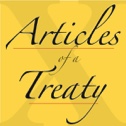Click the logo to go to the Articles of a Treaty
homepage
I have patience and pass over it; although you come over here and get all our gold, minerals, and skins. I pass over it all and do not get mad. I have always given the whites more than they have given me. ‒IRON SHELL, FORT LARAMIE, APRIL 28, 1868
I wanted the poem to emphasize the treaty’s detrimental promises to the Indians who were considered wards of the court ... Then there was the promise of citizenship in return for cultivating and improving land that was already theirs. ‒RONYA GALLIGO-HOBLIT, OGLALA SIOUX TRIBE, 2019
The attempt to make Lakota people farmers mostly failed. Though many still have trust land in their families that goes back to around this time. And it's a bittersweet, paradoxical thing. A lot of our families gained this trust land through the death and suppression of the old way of life. But the trust land still means something to us. ‒TOM SWIFT BIRD, OGLALA SIOUX TRIBE, 2019
Our land is our land until it is deemed “too important” for the government or big corporations ... Whether it has been gold in the Black Hills, or oil sought by companies like DAPL or KXL, time and time again we see these treaty rights forgotten and our lands taken or destroyed, or both. Whereas, when we as people are struggling or getting the lesser end of these treaty deals, the harmful aspects of such treaties are more strictly regulated and “honored”. ‒TALON DUCHENEAUX, CHEYENNE RIVER SIOUX TRIBE, 2019
Article 6. CERTIFICATES and PATENTS
Certificates are documents granting farming allotments in the reservation (320 acres to male heads of households, 80 acres to all other Oceti Sakowin citizens). Patents are documents granting homesteads of land that can be located in the hunting territory in Article 11, the unceded territory in Article 16, or any other reservation.
ARTICLE 6. If any individual belonging to said tribes of Indians, or legally incorporated with them, being the head of a family, shall desire to commence farming, he shall have the privilege to select, in the presence and with the assistance of the agent then in charge, a tract of land within said reservation, not exceeding three hundred and twenty acres in extent, which tract, when so selected, certified, and recorded in the “land-book,” as herein directed, shall cease to be held in common, but the same may be occupied and held in the exclusive possession of the person selecting it, and of his family, so long as he or they may continue to cultivate it.
Any person over eighteen years of age, not being the head of a family, may in like manner select and cause to be certified to him or her, for purposes of cultivation, a quantity of land not exceeding eighty acres in extent, and thereupon be entitled to the exclusive possession of the same as above directed. For each tract of land so selected a certificate, containing a description thereof and the name of the person selecting it, with a certificate endorsed thereon that the same has been recorded, shall be delivered to the party entitled to it, by the agent, after the same shall have been recorded by him in a book to be kept in his office, subject to inspection, which said book shall be known as the “Sioux Land-Book.”
The President may, at any time, order a survey of the reservation, and, when so surveyed, Congress shall provide for protecting the rights of said settlers in their improvements, and may fix the character of the title held by each. The United States may pass such laws on the subject of alienation and descent of property between the Indians and their descendants as may be thought proper. And it is further stipulated that any male Indians, over eighteen years of age, of any band or tribe that is or shall hereafter become a party to this treaty, who now is or who shall hereafter become a resident or occupant of any reservation or Territory not included in the tract of country designated and described in this treaty for the permanent home of the Indians, which is not mineral land, nor reserved by the United States for special purposes other than Indian occupation, and who shall have made improvements thereon of the value of two hundred dollars or more, and continuously occupied the same as a homestead for the term of three years, shall be entitled to receive from the United States a patent for one hundred and sixty acres of land including his said improvements, the same to be in the form of the legal subdivisions of the surveys of the public lands. Upon application in writing, sustained by the proof of two disinterested witnesses, made to the register of the local land-office when the land sought to be entered is within a land district, and when the tract sought to be entered is not in any land district, then upon said application and proof being made to the Commissioner of the General Land-Office, and the right of such Indian or Indians to enter such tract or tracts of land shall accrue and be perfect from the date of his first improvements thereon, and shall continue as long as he continues his residence and improvements, and no longer. And any Indian or Indians receiving a patent for land under the foregoing provisions, shall thereby and from thenceforth become and be a citizen of the United States, and be entitled to all the privileges and immunities of such citizens, and shall, at the same time, retain all his rights to benefits accruing to Indians under this treaty.
Curriculum
